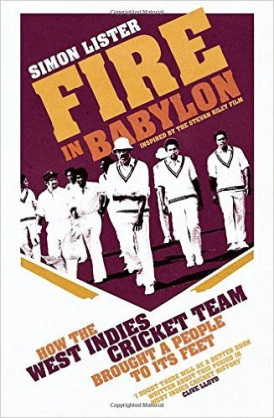Fire in Babylon
Martin Chandler |Published: 2015
Pages: 352
Author: Lister, Simon
Publisher: Yellow Jersey Press
Rating: 5 stars

The story of West Indian cricket begins generations ago, but Simon Lister picks it up in 1975. Back then the men from the Caribbean were on the way up. In England in June they had beaten Australia to lift the game’s first World Cup. In November they lined up against Australia again, in the Aussies’ own backyard, for a six Test series. In the first Test a young fast bowler, Michael Holding, made his debut. The man who soon came to be known as ‘Whispering Death’ lined up in a four man attack and formed a memorable opening partnership with Andy Roberts. The quartet was completed by the veteran off spinner, Lance Gibbs, and a chinaman bowler, Inshan Ali.
Ten weeks later the visitors were in disarray, having lost the series 5-1. And then it got worse. At the spin friendly Queen’s Park Oval in Port of Spain India chased down 406 for the loss of just four wickets to tie up a four Test series at 1-1 after three matches. For the final Test Ali and off spinner Albert Padmore were dropped, and four pace bowlers played. West Indies won, the walking wounded of India being all out after the fall of the fifth wicket of their second innings.
Skipper Clive Lloyd and his successors did not look back. They soon had Tony Greig ‘grovelling’ and while the first choice were giving hell to the world’s best in World Series Cricket another pack of magnificent pace bowlers waited in the wings. One rather tawdry episode in New Zealand in February 1980 apart it was to be the 1990s before the West Indies could be looked upon as mere mortals again. Their tactic of unremitting pace did not appeal to some, but to many more, particularly those from that group of islands in the Caribbean Sea, their cricketers achievements were a source of intense pride.
Fire in Babylon is the story of that West Indian side, the despair after the elation of the World Cup win, and then the almost constant highs thereafter. That much is no surprise, but whilst cricket is very much the subject of the book the matches themselves are merely the pegs on which the real story is hung. If a detailed account of the play is what is required the reader will need to look elsewhere. On the other hand if what is required is an explanation of the social, cultural and political background then Fire in Babylon certainly hits the spot.
Author Simon Lister leaves no stone unturned in this meticulously researched account. Having already written a biography of Clive Lloyd he clearly had the connections, and has used them well. But it is not just the players Lister has spent time with. His reader meets and learns about many ordinary West Indians whose lives were enriched by the pride and self-belief that the team’s success brought.
For those who think they already know about the events the book covers, perhaps because like this reviewer they lived through it, my advice is to make no such assumptions. The West Indian perspective on subjects like that debacle against Australia, World Series Cricket and the rebel tours to South Africa have rarely been dealt with outside individual autobiographies before, and never has a writer cast his net so wide in the search for understanding as Simon Lister has here.
It must be conceded that Lister’s job was made easier by virtue of the work done by Stevan Riley, the director of the film of the same name that appeared to similar acclaim in 2010, but the fact that individuals other than Lister might have contributed to the quality is, in truth, of no more significance than the hoary old conspiracy theory that suggests that someone other than the Bard wrote all or some of Shakespeare’s plays. It is irrelevant because irrespective of how many and whom we have to thank for Fire in Babylon the fact is it exists. It is a gripping read, superbly written and completely seamless. If I were looking to be critical the illustrations were perhaps a little underwhelming, and the majority of them familiar, but that does not detract from the quality of the narrative – generally the decision to give a book a maximum is a tricky one taken only after overcoming a few misgivings, but in the case of Fire in Babylon I have not the slightest hesitation.






Leave a comment